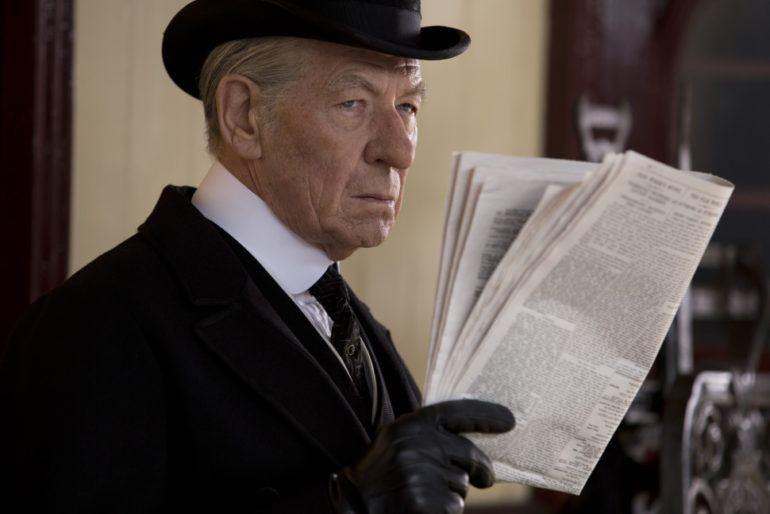Reuniting with his Gods & Monsters director Bill Condon, Mr Holmes provides Sir Ian McKellen with a rare leading role as the titular Sherlock, one amongst many film and television adaptations that Arthur Conan Doyle’s character had undergone in recent years. Separating Condon’s film from the Downey Jr., Cumberbatch and Lee Miller incarnations of late, beyond the obvious ageing up, is a meditative and metatextual approach to the Holmes legend. Based upon Mitch Cullin’s 2005 novel ‘A Slight Trick of the Mind’, Mr. Holmes proves that with the richest of literary figures, there’s always another angle, Jeffrey Hatcher’s screenplay providing a satisfying, occasionally touching look at the effects of aging, memory and the delineation of legacy over time.”
It’s 1947 when we first meet McKellen’s Sherlock, aged 93, en route to his Sussex retreat and in tremendously foul form. He treats his travelling companions, who he doesn’t know, with a distinct level of contempt, barely softened upon his arrival, reconvening with housekeeper Mrs. Munro (Laura Linney) and her son Roger (newcomer Milo Parker). We soon learn that age has taken its inevitable toll upon the now decrepit Holmes, his mind deteriorating as memories become increasingly clouded. His realisation that he cannot remember the details of his final, unsolved case troubles him significantly, triggering a pair of recurring flashbacks, both to the case in question and to his recent trip to Japan. His recollections are compounded by the film’s skewed history of the man’s legend, wherein Watson, not Conan Doyle, was the author behind the novels that popularised the duo, with Holmes himself existing in an alternate universe where screen adaptations of his cases are a regular fixture at the local multiplex.
Hence, what begins as a straightforward examination of ageing expands into an ambitious exploration of the unknowability of distant memories, the glorious simplification that is nostalgia. As one character observes of the often misconstrued true meaning behind stories, “That’s not it, that’s just the picture”. That Holmes rejects these adaptations only intensifies his isolation as his own memories gradually escape him. Bonding with the young Roger over their maintenance of the beehives kept in the farmhouse provides a neat, only occasionally cloying device through which we come to discover the true man behind the myth. The obviousness of the young/old pairing is entirely overcome by the strength of the duo’s scenes together, bolstered by two very strong performances. Parker, in only his second feature, carries off an assured confidence that makes real the boy’s rebellion, and lends weight to the film’s brief third act descent into melodrama. Linney tries her best, but struggles with the accent enough to overshadow an otherwise solid showing. McKellen, as one would expect, ably tackles the complexities and bitterness of Holmes in his final years, contrasted well with the altogether more lively figure he cuts in the London-set flashback. Aided by a script that paints an uncommonly complex, intimate portrait of the iconic sleuth, it’s a performance with phenomenal depth, capitulating with a moving sense of acceptance and calm. If this proves to be Sir Ian’s final lead appearance, he goes out on quite a high.
For all its strengths, Mr. Holmes occasionally stumbles. The ambitious, dual flashback device weakens as the film’s true thematic concerns reveal themselves, the denouement of Holmes’ final case lacking any real emotional heft. Meanwhile, Holmes’ trip to Hiroshima is marred by some stodgy CGI, the bulk of his Japan expedition lacking any palpable resonance until late in the third act. In this final stretch, the film’s slow, measured pace briefly falters somewhat with the injection of real emotional stakes jarring within a narrative previously unconcerned with melodrama. Thankfully however, Mr. Holmes finds its feet in the film’s final moments, providing a satisfying, measured conclusion.

